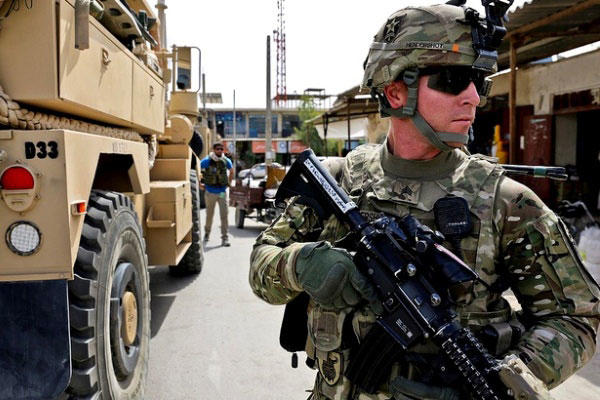The U.S. was tentatively sticking with a plan to draw down the number of troops in Afghanistan from 9,800 to 5,500 by early next year while leaving ample room for President Barack Obama to reverse course, depending on how fighting against the Taliban goes this summer, Defense Secretary Ashton Carter said Wednesday.
At a NATO defense ministers meeting in Brussels, Carter also said the alliance had agreed to extend the NATO Resolute Support Mission in Afghanistan by keeping German troops in the north near Mazar-i-Sharif and Italian troops in the west at Herat, while the U.S. continues to maintain bases in Jalalabad in the southeast and Kandahar in the southwest.
In cautious and sometimes opaque remarks at a news conference, Carter said that troop levels in Afghanistan had not been a formal topic of discussion at the ministerial meetings but then restated the original Obama plan to draw down U.S. forces to 5,500 for 2017.
Going down to 5,500 was "the current plan," Carter said, though "the president has indicated consistently (that) he is willing to look at the U.S. force presence on the basis of circumstances in Afghanistan and he is expected to do that at the end of the year. He has expressed a willingness to do that but that was not a topic of discussion at today's meeting, per se," he said.
Carter said troop levels and funding would likely be fleshed out at a NATO summit in Warsaw next month. However, he said "there should be no doubt about our commitment to Afghanistan."
The secretary's statements contrasted with those of British Defense Secretary Michael Fallon and NATO Secretary Jens Stoltenberg, who were more forthcoming on where the U.S. and the allies would eventually end up on the presence in Afghanistan.
"This is the wrong time to walk away from Afghanistan," Fallon told reporters. "Everyone has an interest that our effort there is sustained. That's why, as Ash Carter told us, the troop numbers are being looked at again."
Stoltenberg said several nations committed to a troop presence next year in Afghanistan. "With a regional presence, we will continue to advise, train and assist the Afghan national forces because we are very committed to continuing to support Afghans," he said.
Carter made no mention of the recommendations on troop levels from Army Gen. John Nicholson, commander of U.S. and NATO forces in Afghanistan.
Army Brig Gen. Charles Cleveland, Nicholson's spokesman, said in a briefing to the Pentagon from, Kabul earlier this month that Nicholson had wrapped up his report, which was believed to be working its way up the chain of command through Army Gen. Joseph Votel, commander of U.S. Central Command, and then to Carter, Joint Chiefs Chairman Gen. Joseph Dunford and the White House.
Nicholson's predecessor, Army Gen. John Campbell, had warned of the dangers of continuing to withdraw U.S. troops while a resurgent Taliban, now amply funded by a bumper poppy crop this spring, was inflicting heavy losses on the Afghan National Defense Security Forces (ANDSF).
In addition, Obama has been expanding the role for U.S. forces in Afghanistan this year, rather than focusing on preparations for more withdrawals.
In January, he authorized U.S. airstrikes against a growing presence of followers of the Islamic State of Iraq and Syria in southeastern Afghanistan.
Earlier this month, Obama lifted a ban on airstrikes against the Taliban, which had been in effect since late 2014, and also approved embedding U.S. trainers and advisers with conventional ANDSF forces, rather than just Afghan Special Forces.
Carter said the changes would allow for "more American firepower through close (air) support" for the ANDSF, and also "more opportunities" for U.S. troops "to accompany and enable" the ANDSF to take back ground lost to the Taliban, particularly in southwestern Helmand province.
The U.S. began the year backing the efforts of Afghan President Ashraf Ghani to draw the Taliban into regional peace talks with the support of China, Russia and Pakistan. Ghani later blamed Pakistan for the collapse of the effort.
The regional prospects took another turn for the worse this week with reports of cross-border clashes with small arms and artillery between Afghanistan and Pakistan.
-- Richard Sisk can be reached at Richard.Sisk@Military.com.
Related Video:




























